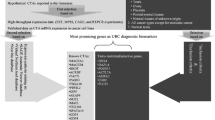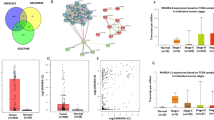Abstract
Bladder cancer exhibits high mortality as a result of limited therapeutic options and a high recurrence rate. Accordingly, novel treatments such as immunotherapy have emerged as promising therapeutic modalities to prolong overall patient survival and effect a disease cure, which has renewed enthusiasm for the identification of tumor-specific target antigens. Cancer-testis (CT) antigens are recognized as ideal targets for immunotherapy because of their expression features and high immunogenicity profiles. Here, we investigate the expression pattern of a novel CT antigen, testis-expressed 19 (TEX19), in patients with bladder carcinoma and among multiple human tissues. Six bladder cancer cell lines (T24, UM-UC-3, J82, 5637, SW780, and RT4) were also analyzed for TEX19 expression. Our results reveal that TEX19 expression in normal tissue is restricted to human testis. In addition, TEX19 mRNA expression was detected in 60 % (24/40) bladder cancer samples, whereas 58.20 % (110/189) were positive for TEXT19 protein expression. Compared to low-grade tumors, TEX19 exhibited increased expression in high-grade tumors, from 53.69 to 77.14 %, respectively (P = 0.011). TEX19 was also expressed in all six bladder cancer cell lines. Together, our findings suggest that TEX19 represents a novel CT gene and might play a role in the progression of bladder cancer and that this gene therefore provides a potential target for immunotherapy treatment strategies against bladder cancer.




Similar content being viewed by others
Abbreviations
- CT:
-
Cancer-testis
- TEX19:
-
Testis-expressed 19
- MAGE-A1:
-
Melanoma antigen-A1
- MAGE-A3:
-
Melanoma antigen-A3
- NY-ESO-1:
-
New York esophageal squamous cell carcinoma-1
- ANCT:
-
Adjacent noncancerous tissue
- qRT-PCR:
-
Quantitative real-time polymerase chain reaction
- SDS-PAGE:
-
Sodium dodecyl sulfate-polyacrylamide gel electrophoresis
- PVDF:
-
Polyvinylidene difluoride
- TMA:
-
Tissue microarray
- H2O2 :
-
Hydroxyl peroxide
- RT:
-
Room temperature
- DAB:
-
Diaminobenzidine
- EST:
-
Expressed sequence tag
- TAAs:
-
Tumor-associated antigens
- MAGE-A:
-
Melanoma antigen-A
- TCC:
-
Transitional cell carcinoma
References
Siegel RL, Miller KD, Jemal A. Cancer statistics, 2015. CA Cancer J Clin. 2015;65:5–29.
Kausch I, Böhle A. Bladder cancer. II. Molecular aspects and diagnosis. Eur Urol. 2001;39:498–506.
Karakiewicz PI, Benayoun S, Zippe C, et al. Institutional variability in the accuracy of urinary cytology for predicting recurrence of transitional cell carcinoma of the bladder. BJU Int. 2006;97:997–1001.
de Bekker-Grob EW, van der Aa MN, Zwarthoff EC, et al. Non-muscle-invasive bladder cancer surveillance for which cystoscopy is partly replaced by microsatellite analysis of urine: a cost-effective alternative? BJU Int. 2009;104:41–7.
Wiener HG, Vooijs GP, van’t Hof-Grootenboer B. Accuracy of urinary cytology in the diagnosis of primary and recurrent bladder cancer. Acta Cytol. 1993;37:163–9.
Páez A, Coba JM, Murillo N, et al. Reliability of the routine cytological diagnosis in bladder cancer. Eur Urol. 1999;35:228–32.
Grossman HB, Natale RB, Tangen CM, et al. Neoadjuvant chemotherapy plus cystectomy compared with cystectomy alone for locally advanced bladder cancer. N Engl J Med. 2003;349:859–66.
Suri A. Cancer testis antigens—their importance in immunotherapy and in the early detection of cancer. Expert Opin Biol Ther. 2006;6:379–89.
Traversari C, van der Bruggen P, Van den Eynde B, et al. Transfection and expression of a gene coding for a human melanoma antigen recognized by autologous cytolytic T lymphocytes. Immunogenetics. 1992;35:145–52.
van der Bruggen P, Traversari C, Chomez P, et al. A gene encoding an antigen recognized by cytolytic T lymphocytes on a human melanoma. Science. 1991;254:1643–7.
Ctdatabase, http://www.cta.lncc.br/
Scanlan MJ, Simpson AJ, Old LJ. The cancer/testis genes: review, standardization, and commentary. Cancer Immun. 2004;4:1.
Karlitepe A, Ozalp O, Avci CB. New approaches for cancer immunotherapy. Tumour Biol. 2015;36:4075–8.
Fratta E, Coral S, Covre A, et al. The biology of cancer testis antigens: putative function, regulation and therapeutic potential. Mol Oncol. 2011;5:164–82.
Kuntz S, Kieffer E, Bianchetti L, Lamoureux N, Fuhrmann G, Viville S. Tex19, a mammalian-specific protein with a restricted expression in pluripotent stem cells and germ line. Stem Cells. 2008;26:734–44.
Cha K, Hadjiiski L, Chan HP, Caoili EM, Cohan RH, Zhou C. Ct urography: segmentation of urinary bladder using class with local contour refinement. Phys Med Biol. 2014;59:2767–85.
Caballero OL, Chen YT. Cancer/testis (ct) antigens: potential targets for immunotherapy. Cancer Sci. 2009;100:2014–21.
Simpson AJ, Caballero OL, Jungbluth A, Chen YT, Old LJ. Cancer/testis antigens, gametogenesis and cancer. Nat Rev Cancer. 2005;5:615–25.
Yin B, Liu G, Wang XS, Zhang H, Song YS, Wu B. Expression profile of cancer-testis genes in transitional cell carcinoma of the bladder. Urol Oncol. 2012;30:886–92.
Fradet Y, Picard V, Bergeron A, LaRue H. Cancer-testis antigen expression in bladder cancer. Prog Urol. 2006;16:421–8.
Messing EM. Urothelial tumors of the urinary tract. In: Walsh PC, Retik AB, Vaughan ED, et al., editors. Campbell’s urology. 8th ed. Philadelphia: W.B. Saunders; 2002. p. 2733–6.
Acknowledgments
This project was supported by the National Natural Science Foundation of China (grant nos. 81170613 and 81270740) and the Shenzhen Basic Research Knowledge Innovation Program (grant no. JCYJ20140416180 323426).
Authors’ contributions
JZ, CY, and XL conceived and designed the study and writing of the manuscript; JL, CW, XZ, and HW carried out the immunohistochemical staining, the morphological analysis, and the scoring of the sections; GY performed RT-PCR and qRT-PCR; JS carried out the western blotting. LL and ML were involved in statistical analysis; JD and LL corrected the paper; AT designed this study and help for writing; all authors have read and approved the final manuscript.
Author information
Authors and Affiliations
Corresponding author
Ethics declarations
All procedures performed in studies involving human participants were in accordance with the ethical standards of the institutional and/or national research committee and with the 1964 Helsinki declaration and its later amendments or comparable ethical standards. This article does not contain any studies with animals performed by any of the authors.
Conflicts of interest
None
Additional information
Jianhua Zhong, Yan Chen and Xinhui Liao contributed equally to this work.
Rights and permissions
About this article
Cite this article
Zhong, J., Chen, Y., Liao, X. et al. Testis expressed 19 is a novel cancer-testis antigen expressed in bladder cancer. Tumor Biol. 37, 7757–7765 (2016). https://doi.org/10.1007/s13277-015-4567-8
Received:
Accepted:
Published:
Issue Date:
DOI: https://doi.org/10.1007/s13277-015-4567-8




